There is intense public debate in the West about ending the war against Ukraine with peace negotiations or a truce. These proposals tacitly or explicitly propose territorial concessions by Ukraine. These plans, argues political scientist Andreas Umland, ignore or downplay significant domestic political obstacles in both Ukraine and Russia. There is also a close link between Russia’s Crimea adventure nine years ago and the second annexation of 2022. Politicians must inform themselves better.
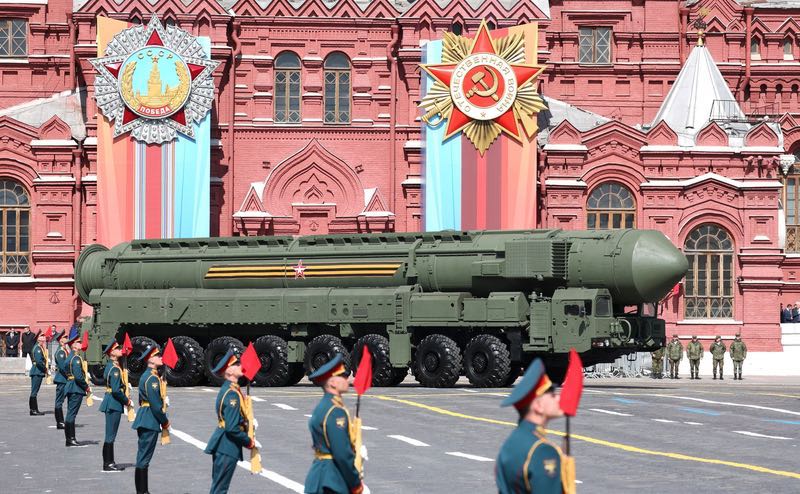 Nuclear arms at Victory Parade on Red Square on 9 May (picture Kremlin)
Nuclear arms at Victory Parade on Red Square on 9 May (picture Kremlin)
The observation by German Chancellor Otto von Bismarck that 'politics is the art of the possible' could express the credo of many self-ascribed pragmatists commenting on Russia’s war of annihilation against Ukraine. Some of these political commentators and policy shapers are today calling for immediate negotiations and a truce between Kyiv and Moscow. They either implicitly or explicitly suggest Ukrainian territorial concessions to Russia to achieve peace in Eastern Europe.
Such proposals are not necessarily expressions of ethical and/or legal nihilism. Even many putatively pragmatic proponents of a rapidly negotiated end to the Russian-Ukrainian war acknowledge, in principle, Ukraine’s right to self-defence. Some even pronounce the desirability of a full restoration of Ukrainian borders. Nonetheless, they assume that Kyiv and/or the West lack sufficient political judgement and strategic prudence when pursuing their confrontational approach to Moscow.
Outspoken Western support for Ukraine is, according to such a viewpoint, motivated by impractical ideals. Emotionally driven hopes are understandable but, so the argument goes, they hinder goal-oriented behaviour. Political pragmatism rather than high idealism – according to the logic of these discourses – will better serve the cause of peace and ultimately even Ukrainian interests.
The Lessons from 2022
As the past year has shown, an evaluation of what is realistic and unrealistic in the Russian-Ukrainian War can be changeable, however. Until February 2022, it seemed to some to be rational and professional to assume that Ukraine would quickly collapse under a full-scale Russian military assault. Some authors before February 2022 even suggested withholding Western weapons from the Ukrainians. Such armaments, so the arguments of the putative pragmatists went, would only prolong Ukraine’s inevitable agony in case of escalation.
This approach not only underestimated the veracity of the Kremlin’s Ukrainophobia. Even at the time of their publication, such propositions were politically unhelpful. They fed Russian expansionist ambitions by communicating publicly that Ukraine was weak, suggesting that Kyiv would not benefit from significant Western support and demobilizing mainstream Western sympathy for democratic Ukraine. Underestimating Ukraine’s patriotic sentiment and military professionalism, they implied that Russia would easily capture Ukraine. Military help for Ukraine was portrayed as impulsive and non-strategic. While these voices did not win the day, they were present, co-shaped the public discourse, and influenced policies.
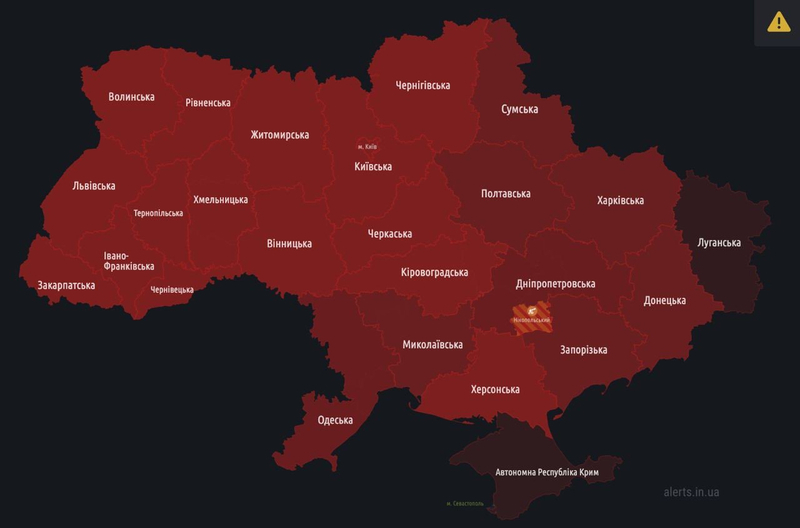 On Russia's Victory Day air alerts all over Ukraine
On Russia's Victory Day air alerts all over Ukraine
Much of their seeming pragmatism was, as became clear later, not only misinformed, but revealed a schematic form of thinking. Simplistic deduction rather than empirical research was applied to generate far-reaching geopolitical interpretations and foreign policy advice. Informed by commonplaces rather than regional knowledge, these arguments were the result of strategic myopia.
As the experience of the previous phase of the war was already suggesting in 2014–21, the conflict between Russia and Ukraine is an existential one – and not just for Ukrainians. It is also of importance to the polity, identity and destiny of the Russian nation. Many politicians, intellectuals and ordinary citizens in Russia understand that the war is not merely about Moscow’s or Kyiv’s territorial and political control over Ukrainian land. Instead, they perceive the confrontation as one over the fate of their own people and state. Since 2014, Russia’s terrorization of the civilian population of annexed Crimea and the occupied parts of the Donbas has been accompanied by increasingly shrill Kremlin rhetoric.
The conflict between Russia and Ukraine is existential not just for Ukrainians, but alos for the Russian nation
These and other features of Moscow’s approach to Ukraine had already suggested before February 2022 that a further expansion of Russia’s power would mean not only an end to freedom for the captured regions. It would also mean a massive violation of human rights for the civilian inhabitants of newly occupied territories. Russian behaviour in Crimea and the Donbas is only a repeat of Moscow’s conduct in Ukraine during the Tsarist and Soviet periods, as well as in other parts of the world – either in the past or more recently.
Impracticality of pragmatism
The omissions contained in some ostensibly realistic assessments in late 2021 and early 2022 of Russia’s final intentions and Ukraine’s ability to withstand Moscow’s assault might be a symptom of a larger issue in debates on international relations. Perhaps it is due not only to a lack of generic realism in estimations of relative power in Eastern Europe. It could also be connected to specific traits in certain aspects of the Realist school in International Relations.
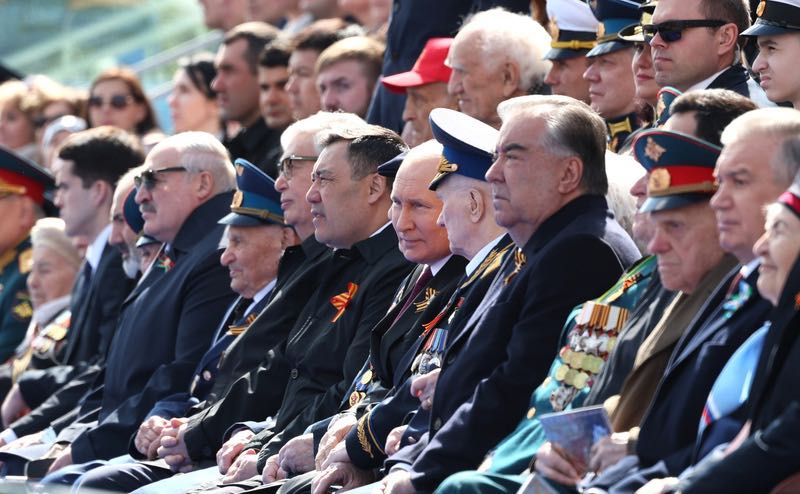 Putin watches Victory Parade on 9 May of 2023, surrounded by presidents of the CSTO (picture Kremlin)
Putin watches Victory Parade on 9 May of 2023, surrounded by presidents of the CSTO (picture Kremlin)
Realism, as an IR theory, does not look much into the domestic affairs of the states whose conflicts it analyses. Some Realists are uninterested in the internal politics and cultures of the countries whose behavior and foreign policy performance they nonetheless seek to predict. This kind of Realism uses only minimal national data to assess the human, military, industrial and technological capacities of the actors involved.
The discipline of International Relations is for such Realists just that. It should be unconcerned about what is happening inside the nations that are relating to each other. It is possible that such modes of thinking contributed to recent misjudgments of Ukraine’s ability to defend itself.
A similar disregard for Ukrainian and Russian domestic affairs is today again leading to myopia in assessments of the chances of a Russian-Ukrainian ceasefire or settlement. There is once more a seemingly realistic plea to go for the possible rather than the desirable. As in earlier suggestions, pursuing such a strategy is presented as a way to tame the conflict between Kyiv and Moscow. The appeal claims to provide a less than ideal, but pragmatic and achievable solution.
Yet, such calls for immediate negotiations and a quick ceasefire are oblivious to the complicated situations that both Zelenskyy and Putin face at home. Rather than being realistic, they raise hopes of an unattainable peace. The prospects for a positive outcome of negotiations are dim as long as the current Russian political regime remains intact, and situation on the ground does not change fundamentally.
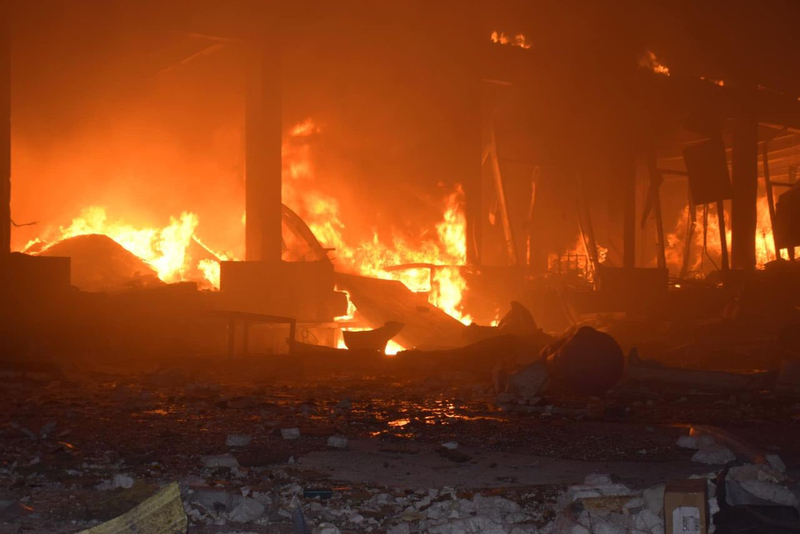 While Ukraine with Europe celebrated the victory in World War 2 on May 8, Russian rockets hit Odesa (picture Southern Command)
While Ukraine with Europe celebrated the victory in World War 2 on May 8, Russian rockets hit Odesa (picture Southern Command)
Ukraine’s and Russia’s constitutions define one and the same region as part of their territory and forbid either side making any territorial concessions. As outlined elsewhere, the official Russian annexations of 2014 and 2022 have created formidable legal obstacles to a political settlement.
Calls for a quick ceasefire raise hopes of an unattainable peace
Some observers argue that laws, including constitutions, can be changed, watered down or easily ignored. This goes especially for authoritarian states like Russia, where power is highly concentrated and that do not respect the rule of law in any way. However, it is not only the formal legal obstacles to a Russian–Ukrainian agreement that are high. There are increasingly large and partly armed political constituencies in both countries that make such a scenario more and more unlikely. These groups, for ideological and other reasons, are strictly against any territorial concessions to the enemy.
Domestic politics of war and peace
The irreconcilable camps in Ukraine and Russia are of a very different stature in ethical, legal and political terms. Whatever their moral and intellectual qualities, however, they are politically significant in both countries. In Ukraine, the hawkish camp comprises a large majority of the population, all the relevant political parties and much of civil society. Most Ukrainians demand full restoration of justice, integrity and sovereignty for Ukraine, and would not agree to any territorial concessions to Russia. This attitude has, thus far, hardened with every additional month of war.
In Russia, the picture is more mixed and fluid, but large parts of the Russian elite and population are convinced of the justness and non-negotiability of Moscow’s right to the annexed Ukrainian lands. In 2022, one opinion poll found that 75% of Russians supported the new annexations. This was, moreover, in spite of the fact that the Russian territorial claims included areas declared part of the Russian Federation in September 2022 but never occupied by Russian troops, or captured and lost again.
The overall Russian outlook may be different from the Ukrainian one with regard to the relative value of the various annexed territories. Russian opinion on the country’s newly acquired lands might differentiate between recently annexed mainland oblasts of Ukraine, on the one hand, and the Ukrainian Autonomous Republic of Crimea captured in 2014, on the other. There was nine years ago and still is today a far-reaching 'Crimean consensus' in Russian society. Mainstream Russian public opinion sees Moscow’s annexation of the beautiful Black Sea peninsula as fundamentally legitimate, strategically prudent and nationally beneficial.
In contrast, the intensity of the imagined Russian historical and cultural connection to the newly annexed Ukrainian dryland oblasts of Donetsk, Luhansk, Kherson and Zaporizhzhia is lower. Many Russians would probably regard a return to Ukraine of the recent acquisitions as less regrettable for their country than the loss of Crimea. Such a differentiation of Russian attitudes to the peninsula occupied in 2014 and mainland territories of Ukraine only acquired in 2022 is behind many of the current supposedly pragmatic proposals for ceasefires and peace agreements .
The assumption of a greater legitimacy and saliency of Russia’s 2014 annexation compared to Moscow’s recent land grab is a commonplace among many observers. It also leads some to believe that the Russian annexations of nine years ago and those of last year can be politically compartmentalized. From this viewpoint, the two annexations should be treated differently in Kyiv’s and Western strategic thinking and diplomatic efforts.
Yet, the current text of the Russian Constitution makes no distinction between the lands annexed in 2014 and those annexed in 2022. It is unclear whether a reversal of the more recent Russian territorial acquisitions would be significantly easier for Moscow than an abrogation of Crimea’s occupation nine years ago. The number of Russian victims in the war for south-eastern mainland Ukraine has been growing by the day for more than a year now.
In contrast to Moscow’s sacrificial intervention since February 2022, the incorporation of Crimea in February and March 2014 was entirely bloodless for Russia (although not so for Ukraine). The human costs for Russia of the recent capture of the four newly annexed oblasts has been high, and is still rising. The political stakes of a hypothetical return of the newly occupied territories are increasing. Some of those who have lost comrades, friends or relatives in the war in south-eastern Ukraine have access to weapons.
Ukraine’s Crimea and Mainland
There are other reasons why Russia’s 2014 Crimea and 2022 mainland annexations in Ukraine cannot be easily kept apart in hypothetical negotiations. The economic, social and political sustainability of the Black Sea peninsula is closely linked to Russia’s control of the territories annexed last September. The geographical and economic interconnectedness between Crimea and Ukraine’s south-eastern dryland was a major cause of Moscow’s full-scale invasion in 2022.
Similar motivations had been behind Crimea’s inclusion by the Tsarist government in the Taurida Governorate in 1802. This administrative unit of the late Romanov empire covered, in addition to the Black Sea peninsula, much of today’s south-east Ukrainian mainland. None of the territory of today’s Russian Federation, by contrast, was part of the Taurida Governorate.
In 1954, Crimea’s close link to the Ukrainian drylands to the north became important once again, now within the Soviet Union. The deep connections between various parts of Ukraine’s Black Sea coast determined an initially marginal administrative but later highly political change within the Soviet Union. Socio-economic calculations were a major reason why the peninsula was transferred by the Soviet government to the Ukrainian Soviet Socialist Republic (UkrSSR) from the far-away Russian Soviet Federal Socialist Republic (RSFSR) to which it had belonged as an exclave since 1922.
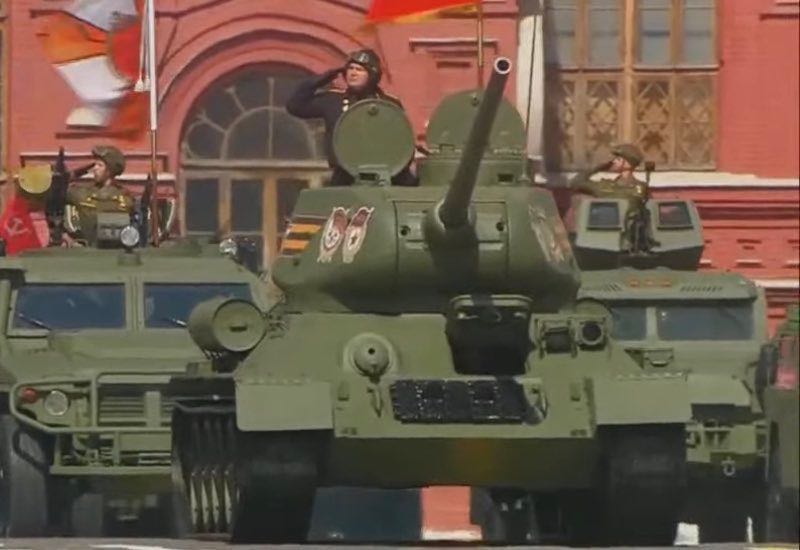 One Russian tank - T34 - made it to the Victory Parade on 9 May in Moscow
One Russian tank - T34 - made it to the Victory Parade on 9 May in Moscow
Some less rational factors certainly determined the decision by Putin to pursue a major war of conquest and massive annexation in 2022. These included, among other things, popular irredentism, post-Soviet ressentiment, imperial hunger, colonial ambition, hegemonic posturing, strategic miscalculation and fascistic impulses.
The most pragmatic determinant of Moscow’s 2022 full-scale invasion of southern Ukraine, however, was the geo-economic and security-political unsustainability of Crimea as a permanent Russian exclave. The peninsula was, also in view of continuing Western sanctions against Crimea since 2014, unlikely to ever become self-sufficient. As long as it was located far away from and had no land connection with Russia, it would continue to drain large subsidies from Russia’s central budget.
The most pragmatic reason for Moscow’s 2022 invasion was the unsustainability of Crimea as a permanent Russian exclave
Some of the same foreign observers who still consider Putin a rational actor ignore these practical determinants of Russia’s 2022 annexations. Putative pragmatists believe that Putin might, if allowed to keep Crimea, be persuaded to leave mainland Ukraine alone. Such policy shapers forget, however, the political and economic importance of Russia’s rule over Ukraine’s south-eastern mainland for a continuation of Moscow’s more salient and older Crimean adventure.
Moscow’s control of the newly acquired territories in south-eastern Ukraine is not only logistically relevant for linking Russia and the peninsula by adding a northern land bridge to the southern Kerch Bridge linking Crimea to Russia. The newly annexed Ukrainian dryland areas also contain natural resources important to Crimea. This concerns, in particular, the fresh water that flows from the Dnipro river through the North Crimean Canal to the peninsula.
A partial reversal of the recent enlargement of Russia in a new Russian constitutional reform would be somewhat more likely than Ukraine’s voluntary reduction of its internationally recognized state territory. It will, however, at least for the Putin (or for a post-Putin Putinist) regime, be more difficult to accomplish than the initial annexations. The latter took a matter of days in September 2022. An abrogation of this official expansion of Russia and expulsion of territories now regarded as a full part of the Federation would, for most Russian nationalists, be embarrassing, if not illegitimate.
A surrender of now officially Russian state territories could also be suggestive for other Russian regions. In case of a deep socio-economic crisis such as that of the early 1990s, various republics and districts of Russia might consider following the example of a return of the annexed territories to Ukraine with a departure from the Federation. The Russian political and intellectual elite is only too aware of such risks. It will therefore be reluctant to create a precedent for a future break away of Russian regions from the Federation.
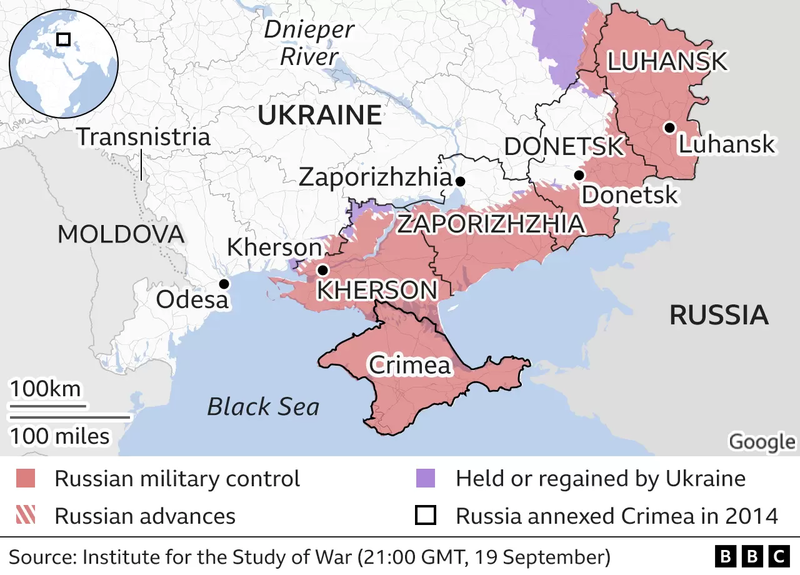
In september 2022 Russia annexed 4 Ukrainian provinces. Until this day they didn't manage to conquer this territory completely. (Map: ISW)
Conclusions and recommendations
Many recent calls for a ceasefire or peace negotiations are built on the supposition that Russia, Ukraine or even both can give up areas that currently are official parts of their state territories. Such assumptions are speculative. They do not problematize the fact that the regions that Moscow annexed in 2014 and 2022 are now claimed by both the Ukrainian and the Russian constitutions. The two countries’ presidents are, as 'guarantors' of their constitutions, obliged to implement their basic laws.
Neither Kyiv nor Moscow can easily go against domestic constituencies that oppose territorial concessions to the enemy
Proposals that remain silent on this fundamental issue are typically also ignorant of the political hindrances to constitutional change that a sustainable deal between both countries would require. The assertion of pragmatism by various proponents of a Russian-Ukrainian accommodation is therefore empty. Such commentators propagate plans that, under current conditions, are unrealistic. Neither Kyiv nor Moscow can easily go against domestic constituencies that are strictly against any territorial concessions to the enemy state.
Suggesting that an agreement between Ukraine and the current Russian regime is within reach is thus misleading. Such comments create false expectations of ongoing diplomatic efforts to sooth the armed conflict. They conjure up discursive dead ends in public debates about current and future military support for Ukraine. Repeated calls for negotiations can create the illusion of a political alternative to Ukraine’s ongoing armed efforts to liberate its occupied territories.
In this way, they postpone, reduce and hinder more resolute Western help for Kyiv. While publicly promoting peace, the effects of oral and written interventions by these pacifists paradoxically prolong the current war. They, of course, also imply a devaluation of international law and subversion of the European Security Order.
Against this background, government officials, politicians, journalists and other commentators should take an informed approach to calls for swift negotiations and refrain from pushing the 'peace for land' narrative. Both policymakers and opinion formers should, in their closed and public deliberations and actions:
- Be aware of the legal challenges in both Ukraine and Russia to reaching a compromise;
- Keep in mind the domestic constituencies in both countries that hinder such a scenario;
- Consider annexed Crimea’s geographic and economic connection to the other annexed territories; and thus
- Regard as flawed the idea that Russia can be satisfied just with control of Crimea.
Policy proposals should as far as possible be based on the facts on the ground. The provision of historical, legal, economic and political detail is the best antidote to opponents of further support for Ukraine. In many cases, a simple listing of some relevant particulars of the domestic affairs of Russia and/or Ukraine should be sufficient to question seemingly pragmatic discourses calling for a quick peace.
Dr. Andreas Umland is an Analyst at the Stockholm Centre for Eastern European Studies (SCEEUS) at the Swedish Institute of International Affairs (UI). This article is based on a recent SCEEUS report published here: https://sceeus.se/en.
